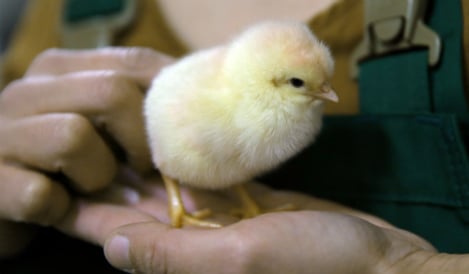The measure passed by the cabinet envisages a ban on mass chick killing from 2022 in “a significant step forward for animal welfare,” Agriculture Minister Julia Klöckner said in a statement.
In many poultry businesses, male chicks are separated from females soon after hatching and shredded or gassed as they do not produce eggs and generate less meat.
Tens of millions of males are culled in Germany every year.
Animal welfare activists have long campaigned to end the practice but farmers have complained there is no practical, affordable and cruelty-free alternative.
But methods to determine the sex of chicks before they hatch are available to farmers, according to the government.
'First in the world'
One technique, developed by a German firm, involves using a laser to make a tiny hole to extract liquid from a fertilised egg, before testing it for the presence of a female hormone.
“We have invested millions of euros in alternatives, bringing animal welfare and economic efficiency together on German soil,” Klöckner said.
READ ALSO: Germany and France push EU to end shredding of male chicks
Saying Germany would be “the first in the world” to proceed in this way, Klöckner stated it wants to “set the pace and be a role model for other countries”.
From 2024, the draft law will also require poultry farmers to use methods that work at an earlier stage in the incubation process, preventing pain for the unhatched embryos.
The European advocacy group Foodwatch criticised the move, saying it did not go far enough in an industry that also causes suffering for animals in other ways.
“If only the cruel practice of killing chicks in Germany is ended, this will change absolutely nothing about the unbearable suffering of laying hens,” said Martin Rücker, executive director of Foodwatch.
'Partial solution'
The German Poultry Association said the plans were only a “partial solution to the problem”, claiming they would also lead to “immense competitive disadvantages” for German poultry farmers.
The association said it welcomed the phasing out of chick culling but saw “serious shortcomings” in the draft law, including that it would not apply anywhere else in Europe.
The legislation must next be approved by the Bundestag, the lower house of parliament.
Germany and France committed in January 2020 to work together to end the practice of chick shredding by the end of 2021.
French Agriculture Minister Didier Guillaume has also committed to outlawing the practice in France from the end of 2021.
Switzerland banned the shredding of live chicks last year, but still allows them to be gassed.
In June 2019, a German court ruled that the slaughter could continue until a method was found to determine the sex of an embryo in the egg.
An EU directive from 2009 authorises shredding as long as it causes “immediate” death for chicks less than 72 hours old.



 Please whitelist us to continue reading.
Please whitelist us to continue reading.
Lets hope the Cocks enjoy life!